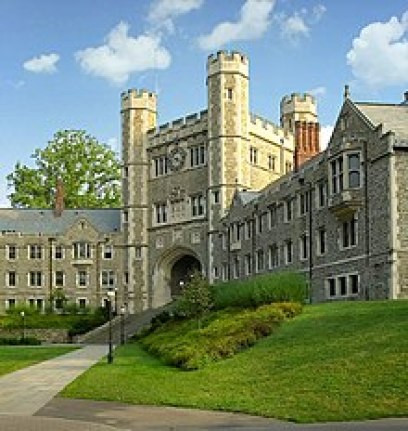Sometimes in life we need to face difficult truths. If we have been on the wrong side of an issue, we need to be open to change, and open to declaring an “about-face.” Even if it hurts!
And so, after thirty years of teaching and promoting education, after thirty years of giving largely unsolicited advice to parents about educating their children, after thirty years fighting an uphill battle to help market education for struggling schools that purport to “educate,” I think it is now time to consider a different point of view. Do we really need to educate our children?
Why not just baptize them and give them a good training?
There is no need to pull down the current institutions of learning – our current schools colleges and universities. No need whatsoever, because they have all already abandoned education for at least a century now…that is, they have abandoned everything that the word stands for but have kept the word itself. And so there is no need to change marketing materials. We just need to understand that every time we hear the word ‘education’ nowadays, we should simply understand that what is really meant is “training.”
I wish to provide five excellent reasons why parents should avoid giving their children an education and should, rather, do all they can to give them a proper training– but before beginning, let us distinguish our terms just a little.
Education concerns itself with the refinement of the intellect so that it might bring all things to bear on the truth. Education is about forming the mind so that it can look throughout the world and the cosmos and see the various orders that exist.
To gaze upon the orders that exist – whether the orderly beauty amidst the ranks of the humblest creatures’ (even inanimate!) spheres of existence, or whether it is to gaze upon the order that exists among the sphere in which man himself lives – in society and in his own soul, or whether it is to marvel at the order that exists in the spheres above him-

the starry heavens and even among the separated substances – and perhaps whether it is, at last, to gaze upon the Divine cause of all this order Himself, God.
This is, roughly, what education is about.
Training has to do with adapting the mind and making it excellent at special works; making the mind, and the hands, adept at the performance of specific and productive tasks.

Training involves developing a single-minded focus on a limited sphere of activity and developing the habits that belong to performing that activity with excellence! Whether managing a portfolio, or performing heart surgery, or installing fiber optic cables,

or designing efficient systems for selling anything on the internet! What a wonderful thing training is! Thank goodness we have schools colleges and universities which are “doing first-class work as training-schools.” Really, we can’t have too many of them.
In 1937, the American Libertarian Albert Jay Nock had already noticed a confusion of these terms (i.e. Education and Training) and wrote about it in his famous essay “The Disadvantages of Being Educated”. When examining what was going on in the colleges and universities at the time, he said that the ‘education’ they purported to impart,
aimed at what we used to call training rather than education; and it not only did very little with education, but seemed to assume that training was education, thus overriding a distinction that formerly was quite clear. Forty years ago a man trained to proficiency in anything was respected accordingly, but was not regarded as an educated man, or “just as good,” on the strength of it. A trained mechanic, banker, dentist or man of business got all due credit for his proficiency, but his education, if he had any, lay behind that and was not confused with it.

In other words, if a man is educated, that is something quite apart from whether he is trained to be ‘successful’ in the world. Education does not have a direct bearing on what is meant by success. If anything, education is something that lies further back in the soul. It is something “behind” training, without being necessary at all to training.
An interesting pastime for every teacher is following the path and careers of his former students. Teachers of course are naturally interested in what happens to their students after they leave their charge and make their path off to college or simply dive directly into the world.
It has often struck me, although I am not yet ready to make a sweeping generalization, that very often the students that appear to have the most intellectual talent and are perhaps the most industrious in their studies, do not, surprisingly, appear to be identical with the students that appear to make their way in the world in a manner that would be recognized as being the most “successful.”
Education, says Albert J. Nock,
“…leads a person on to ask a great deal more from life than life, as at present organized, is willing to give him; and it begets dissatisfaction with the rewards that life holds out.”
Whereas,
“Training tends to satisfy him with very moderate and simple returns. A good income, a home and family, the usual run of comforts and conveniences, diversions addressed only to the competitive or sporting spirit or else to raw sensation – training not only makes directly for getting these, but also for an inert and comfortable contentment with them.”
I hate to say it, but could it be that education might actually be counterproductive? Suppose you would like to have a successful son, could it be that insisting that he obtain an education might be to do nothing other than to place a sizable obstacle in his path?
I think so, and here are five excellent reasons why everyone should avoid being educated:
- Education instills in the mind of its suitors an interest in things that are of very little interest to most people.
This is easy to understand. Just go ahead and pick up a book of Euclid’s’ Elements. Here is how it begins:
“A Point is that which has no part.”
What does that mean? And suppose we try to find out? Where will that leave us? Who really cares about what a point is anyway? What does this have to do with the price of a loaf of bread and a gallon of gasoline? Nothing really. Can you blame anyone for not really caring about what a point and a line are?
Anyone who studies Euclid’s Geometry will quickly develop a taste for theoretical truth and, sometimes, a corresponding distaste for anything that smacks of the practical. And this leads to our second excellent reason.
2. Education fosters a distaste for practical things.
This point is again illustrated very well by the story told by the fifth century compiler of Greek manuscripts, Stobaeus:
… someone who had begun to learn geometry with Euclid, when he had learnt the first theorem, asked Euclid, “What shall I get by learning these things?” Euclid called his slave and said, “Give him threepence since he must make gain out of what he learns”.
A proper education, that is a liberal education, is called liberal precisely because it is not at the service of things practical. That is why it appears to have been only an education that the wealthy of aristocratic could afford to obtain. They had what they needed already for living well – at least as regards food, shelter and clothing.
3. Education tends to be divisive and isolates the one who receives it.
This reason was clarified for me by Mr. Nock. He says,
Education deprives a young person of one of his most precious possessions, the sense of co-operation with his fellows. He is like a pacifist in 1917, alone in spirit – a depressing situation, and especially, almost unbearably, depressing to youth. “After all,” says Dumas’s hero, “man is man’s brother,” and youth especially needs a free play of the fraternal sense; it needs the stimulus and support of association in common endeavour.
The student who makes the ill-fated decision to become educated will in that decision unknowingly cause the separation between himself and all of his peers, and indeed, perhaps even the greater part of humanity.
Why is education divisive? Well, just think about Socrates for a moment. He was a gadfly! In his relentless pursuit of truth he could not help but to uncover and expose the lack of wisdom in anyone else who claimed to have wisdom. I am afraid that this is an inescapable characteristic of anyone who wishes to be educated or wise, he must walk in the footsteps of Socrates.
Training, on the other hand, brings one into society and helps one to fit in as a normal participant in the human race. Mr. Nock remarks,
At present one can afford only to be trained. The young person’s fellows are turning all their energy into a single narrow channel of interest; they have set the whole current of their being in one direction. Education is all against his doing that, while training is all for it; hence training puts him in step with his fellows, while education tends to leave him a solitary figure, spiritually disqualified.
4. Education creates a distaste for barter and exchange.
Now this is a real disadvantage for anyone who happens to live in this world. Liberal education, as was mentioned, arose out of man’s desire to know for its own sake. Liberal education arose out of the divine instinct for knowledge, implanted by the Creator in our souls, an instinct that we call ‘wonder.’ Wonder is the desire to know something in its causes, and for its own sake. The person who wonders about something does not wonder because he wishes to make money or do something with the knowledge. He simply wishes to know. He is like a child in this regard. Like a child he chants in his best Trochaic meter,
Twinkle twinkle little star,
How I wonder what you are!

The child does not wish to sell the star. Socrates was poor. He did not sell his knowledge to students like the sophists of his day. Wisdom is not for sale. Like a beautiful lady, one does not court her for her wealth or for her connections or for some other advantage. She demands of her suitors that she be loved for her own sake. And just so does Lady Philosophy appear to Boethius in his prison cell after he has suffered the terrible ups and downs of fortune’s wheel.
By a liberal education, the mind of the student is habituated towards a love of things that cannot be bought or sold. Unfortunately, those who develop this love cannot help but develop a corresponding clumsiness and even distaste for things that are measured in terms of dollars and cents.
This leads us to the fifth reason why education should be avoided.
5. Education tends to produce the gentleman, and the gentleman no longer has a place in society.
Blessed Cardinal John Henry Newman famously said,
Liberal Education makes not the Christian, not the Catholic, but the gentleman.
Newman did not mean that liberal education produces a man who dresses and adopts the fashions of the day as they are set forth in say Gentleman’s Quarterly or some-such other worldly standard. No, he meant that liberal education produces a refinement of mind, manners, speech, and bearing such that the man becomes properly responsive to beauty, goodness and truth!
Here are some highlights of the gentleman according to Newman:
Hence it is that it is almost a definition of a gentleman to say he is one who never inflicts pain…He is mainly occupied in merely removing the obstacles which hinder the free and unembarrassed action of those about him; … The true gentleman in like manner carefully avoids whatever may cause a jar or a jolt in the minds of those with whom he is cast;… He has his eyes on all his company; he is tender towards the bashful, gentle towards the distant, and merciful towards the absurd; …he is seldom prominent in conversation, and never wearisome. … He never speaks of himself except when compelled, never defends himself by a mere retort…
In this world we are taught that a person must “market” himself, and do what one may to make himself desirable over others in order to “get ahead.”
In the words of Mr. Nock,
Again, education tends towards a certain reluctance about pushing oneself forward; and in a society so notoriously based on the principle of each man for himself, this is a disadvantage.
And so it is clear that those who seek an education thereby seek at least the five disadvantages that I have enumerated. There are undoubtedly more, but these alone are enough to demonstrate how difficult life will be for the educated person.
Therefore, parents take note!
Do you desire successful children?
Do you hope that your children will fit in as normal and ‘happy’ participants in society?
Do you love your children to the extent that you hope they will live comfortably and harmoniously in this world?
Well then, if your answer was “yes” to these questions, then by all means, don’t educate them!








Thank you for an enjoyable read. I’m married to an educated gentleman, and I have first-hand evidence of the truth of your assertions. I was nodding and smiling through most of your post. As you might expect, I wouldn’t have it any other way. Also, despite the dangers, we have tried to educate our children a little. I doubt they will be very successful in worldly terms. I’m at peace with that, and I think they are too.
Thank you Sarah,
I am glad that you didn’t find it too compelling! And I suppose your kids could get themselves trained after they ‘get themselves’ an education. 🙂
We’ve tried to give them a little of both: education _and_ training. The first one has just finished college with a marketable skill (Spanish), an enquiring mind, and a Catholic outlook on life. I’m not so sure whether our strategy has worked with the second one. Time will tell, I suppose.
Good, Spanish is definitely marketable! (as opposed to fairly useless Latin and Greek 🙂 which is all my kids know.
Now if we could only find a way to market the classical languages!
And I suppose you taught your children other ‘useless’ things like how to sing, chant maybe, and pray? All I can say is – Thank God for families like yours, who keep the embers of civilisation aglow.
We had a few false starts at trying to learn Latin as a family but we haven’t done so well so far. Coincidently, we were just about to have another stab at it. My husband was further along than the rest of us because he was receiving instruction from the parish priest. Unfortunately, that priest was moved to another parish a few years ago.
We haven’t tried Greek but we’ve had a good go at Russian recently, which might be useful for deciphering icon inscriptions. But your post has made me wonder why we bother when we could just Google it… Only kidding.
God bless you and your family.
You are too kind!
It is very difficult for a parent to balance the desire to educate our children and develop in them the skills they need to be able to provide for themselves and their families. In my own experience, if you want to pursue for instance a career in science or engineering, you are not going to have much time for leisure and education. The amount of training necessary to pursue certain fields demands far too much of your time and effort.
Always love catching up on your posts Mr.Langley! They never fail to inspire me to think deeply and laugh wholeheartedly! 🙂
Maureen,.I am flattered that you are a reader! I am also glad that they make you laugh…although, didn’t you think this post was kind of depressing? 😉
Depressing yes… looking up from laboring over the Iliad, trying to become a better philosopher, to see men fiddling over wicker, striving toward becoming better ‘underwater basket weavers’ is rather disheartening… but reading your posts reminds me of being in your class and experiencing your enthusiasm for real education in person, its because of those fond memories that I laugh! 🙂
Reblogged this on A Grain of Salt and commented:
Interesting question: Is education–real education–worth it?